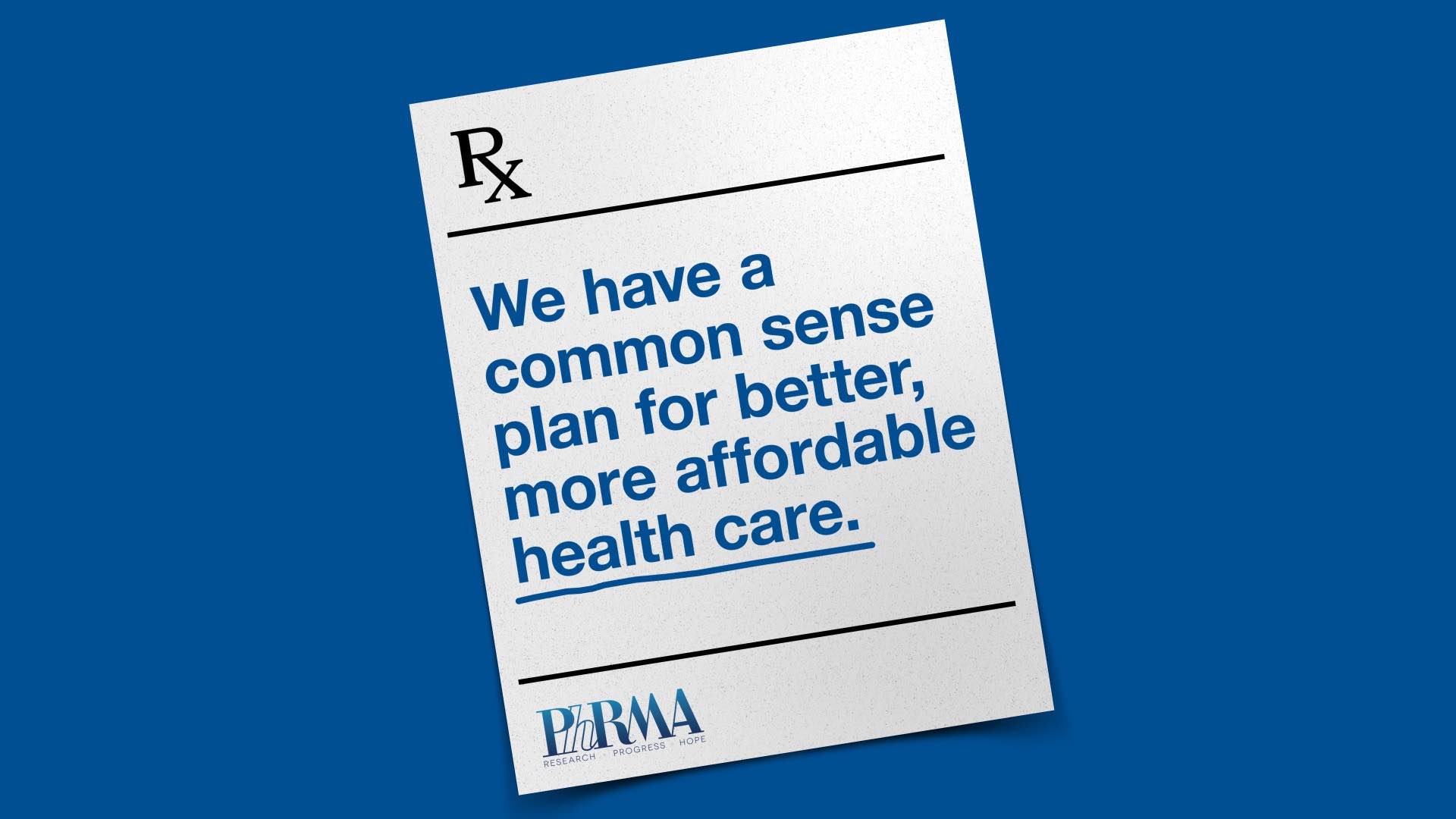| | | | | | | Presented By PhRMA | | | | Vitals | | By Caitlin Owens ·Apr 13, 2021 | | Good morning. 🎂 Happy 1st birthday to the Axios app! Download it for the cleanest, fastest way to get Axios on your phone. Today's word count is 986, or a 4-minute read. | | | | | | 1 big thing: Democrats, led by Biden, are aiming big on health care |  | | | Illustration: Aïda Amer/Axios | | | | Democrats are exploring adding a huge array of health policies to upcoming spending legislation, ranging from further enhancing Affordable Care Act subsidies to allowing Medicare to negotiate prescription drug prices. Why it matters: The next few months may give Democrats the opportunity to walk the walk after campaigning extensively on health care for years, and to plug some of the glaring holes in the system that were exposed by the pandemic. - "It's not just a moment, it's the opportunity to address an undeniable set of problems that have been highlighted to a great degree during the COVID pandemic crisis," Democratic health strategist Chris Jennings said.
Where it stands: President Biden is expected to release his blueprint for a giant package of family-related policies, including health care, in the coming weeks. Details: House Speaker Nancy Pelosi is pushing the White House to prioritize a permanent expansion of the ACA's premium subsidies, the Washington Post reports. The last coronavirus package expanded them through 2022. - Additional ACA changes are also being explored.
- Some Democrats also want to find a way to provide health insurance to poor adults in states that haven't expanded Medicaid, as Politico first reported.
- Biden has already proposed including $400 billion in his infrastructure plan to help provide seniors medical care at home, WSJ reports.
More controversial moves are also on the table, including lowering the Medicare eligibility age — which Sen. Bernie Sanders is pushing for, per the Post. Hospitals strongly oppose that change. - Sanders is also pressing to expand Medicare benefits to include dental, vision and hearing care.
Between the lines: Democrats want to help pay for these coverage expansions by lowering prescription drug prices, including by letting Medicare negotiate prices. - But that would meet fierce resistance from the pharmaceutical industry, which had an incredibly strong track record of lobbying wins even before it developed coronavirus vaccines.
Go deeper. |     | | | | | | 2. Young people are driving the COVID surge |  | | | Illustration: Brendan Lynch/Axios | | | | Young, unvaccinated people — including children and teenagers — are driving the recent rise in coronavirus cases, the Wall Street Journal reports. The big picture: Young adults have always been the primary drivers of the pandemic, but cases are increasing among children and hotspots are seeing more hospitalized patients in their 30s and 40s. - More than half of new cases nationally are among people aged 18 to 54, per the CDC.
- That's not really good news. But it also wouldn't be good news if older, vaccinated people were driving the surge; the fact that they're not is another sign that the vaccine is working.
What's happening: In Michigan, the hardest-hit state in the country right now, adults aged 20 to 39 have the highest daily case rates, and case rates for children aged 19 and under are at a record, per WSJ. - School sports have become a major source of transmission, experts say. Easter and spring breaks have also contributed to caseloads.
"Because young adults are a mobile and active segment of the population, they are likely to come in contact with numbers of people of all ages," Philip Landrigan, an epidemiologist and director of the Program for Global Public Health and the Common Good at Boston College, told the Journal. - "I strongly encourage the young adults to be considerate and kind to the people around them who are more vulnerable to the COVID virus than they are."
|     | | | | | | 3. Illinois extends Medicaid coverage | | Illinois on Monday became the first state to extend Medicaid coverage for new mothers, offering a year of coverage instead of the standard 60 days, Axios' Marisa Fernandez reports. Why it matters: 52% of pregnancy-related deaths in the U.S. occur within a year of giving birth. In Illinois, it's 80% of maternity deaths, Health and Human Services Secretary Xavier Becerra said on a media call Monday. Details: Coronavirus stimulus legislation allowed states to seek the extension, and more states will likely follow suit. The big picture: The expansion may also help shrink the maternity death rate across race and ethnicities, Becerra said. - Medicaid pays for nearly half of all births in the U.S. and is the largest payer for births among women of color. Black women are 2.5 times more likely to die from a pregnancy-related cause than white women.
- Illinois has one of the highest maternal death rates for Black women in the country.
- Postpartum coverage can help mothers manage pre-existing conditions or get access to mental health services, HHS said.
|     | | | | | | A message from PhRMA | | Instead of breaking what works, let's fix what's broken | | |  | | | | America's unique R&D ecosystem delivered multiple COVID-19 medical breakthroughs in recordbreaking time. As we continue our work to help end the pandemic, we have a common sense plan for better, more affordable health care — for everyone. | | | | | | 4. The latest in the global vaccination race | | The director of the Chinese CDC acknowledged on Saturday that China's homegrown COVID-19 vaccines "don't have very high protection rates," Axios' Dave Lawler writes. - Officials are considering changing the dosages of the vaccines or giving one dose of two different vaccines, he said.
- China is trying to ramp up its domestic vaccination campaign, which has been marred not by skepticism of the shots themselves but by a lack of urgency because the virus is largely under control.
Regulators in Slovakia have claimed Sputnik V vaccines shipped from Russia had different characteristics than the vaccine that received positive reviews in The Lancet medical journal, raising serious quality control concerns. - The backstory: The Lancet article, which found the vaccine to be 92% effective, gave a massive boost to Sputnik's global reputation. Sputnik's makers referred to the Slovakian claims as "fake news."
- Several EU countries are in talks to buy or produce the vaccine. Russia has exported it around the world, but often in fairly small quantities due to insufficient manufacturing capacity.
Secretary of State Tony Blinken told NBC's "Meet the Press" on Sunday that the U.S. would become "the world leader on helping to make sure that the entire world gets vaccinated." - Yes, but: He offered no details on when or how the U.S. would begin sharing doses with the rest of the world except to say a framework was being developed.
|     | | | | | | 5. Catch up quick |  | | | Illustration: Aïda Amer/Axios | | | | Michigan can't vaccinate its way out of a COVID-19 spike, Centers for Disease Control and Prevention director Rochelle Walensky said at a briefing Monday, during which she called on the state "to close things down." Axios Re:Cap was joined by Vanity Fair contributing editor Katherine Eban to discuss her recent reporting, which revealed how Operation Warp Speed vaccine contracts were structured and how the U.S. ended up with a stockpile it cannot distribute abroad. Facebook plans to begin delivering notifications to users in their News Feed about vaccine eligibility in 20 countries starting this week, the company said Monday. People in England are enjoying some semblance of normalcy — and pouring their first pints in public — after COVID-19 restrictions eased at midnight Monday, allowing non-essential locations like salons, gyms and pubs to reopen for the first time since January. |     | | | | | | A message from PhRMA | | Instead of breaking what works, let's fix what's broken | | |  | | | | America's unique R&D ecosystem delivered multiple COVID-19 medical breakthroughs in recordbreaking time. As we continue our work to help end the pandemic, we have a common sense plan for better, more affordable health care — for everyone. | | | | | | Axios thanks our partners for supporting our newsletters.
Sponsorship has no influence on editorial content. Axios, 3100 Clarendon Blvd, Suite 1300, Arlington VA 22201 | | | You received this email because you signed up for newsletters from Axios.
Change your preferences or unsubscribe here. | | | Was this email forwarded to you?
Sign up now to get Axios in your inbox. | | | | Follow Axios on social media:    | | | | | |






No comments:
Post a Comment